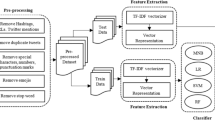Abstract
This paper presents the performance of Twitter sentiment analysis on the Agricultural Ministry of India and also determines the optimal AI model between random forest (RF) and k nearest neighbours (KNN) algorithms. ‘Twitter and Reddit Sentimental Analysis’ dataset from Kaggle is used to train and test the RF and KNN AI models. Term frequency-inverse document frequency (TF-IDF) vectorizer is used to extract features from the obtained dataset. The optimal AI model is determined using the library functions of scikit-learn-2.0 which perform the training and testing of the dataset. Twitter authenticated API called Tweepy is used to create the dataset required to determine the public sentiment towards the Agriculture Ministry by us. This dataset includes 6000 tweets related to the Agriculture Ministry. The Twitter sentiment analysis performed determines what percentage of public opinion towards the Agriculture Ministry is positive, negative and neutral.
Access this chapter
Tax calculation will be finalised at checkout
Purchases are for personal use only
Similar content being viewed by others
References
Vasudevan, S., Meenakshi, G.: Comparison of sentiment analysis of government of India schemes using tweets. Int. J. Comput. Sci. Eng. 6, 998–1001. https://doi.org/10.26438/ijcse/v6i6.9981001
Sharma, S., Shetty, N.: Determining the popularity of political parties using Twitter sentiment analysis (2018). https://doi.org/10.1007/978-981-10-7563-6_3
Verma, P., Khanday, A., Rabani, S., Mir, M., Jamwal, S.: Twitter sentiment analysis on Indian government project using R. Int. J. Recent Technol. Eng. 8, 8338–8341 (2019). https://doi.org/10.35940/ijrte.C6612.098319
Naldi, M.: A review of sentiment computation methods with R packages (2019)
Zope, V., Karmarkar, A., Shivani, M., Pawar, V., Tewani, K.: Analysis of twitter reactions to government policies. Int. J. Adv. Res. Ideas Innov. Technol. 4(1) (2018). www.IJARIIT.com
Chen, H., Franks, P., Evans, L.: Exploring government uses of social media through twitter sentiment analysis. J. Digital Inform. Manage. 14, 290–301 (2016). https://doi.org/10.6025/jdim/2016/14/5/290-301
Kaur, R., Kaur, R., Singh, M., Ranjan, S.: Twitter sentiment analysis of the Indian union budget 2020. Int. J. Adv. Sci. Technol. 29(4s), 2282–2288 (2020). Retrieved from http://sersc.org/journals/index.php/IJAST/article/view/10258
Pihlqvist, F., Mulongo, B.: Using rule-based methods and machine learning for short answer scoring (2018)
Naiknaware, B.R., Kawathekar, S., Deshmukh, S.: Sentiment Analysis of Indian Government Schemes using Twitter Datasets (2017)
Pak, P.: Twitter as a corpus for sentiment analysis and opinion mining. In: Proceedings of the Seventh International Conference on Language Resources and Evaluation (LREC’10). European Language Resources Association (ELRA) (2010)
Mishra, P., Rajnish, R., Kumar, P.: Sentiment analysis of Twitter data: case study on digital India. In: 2016 International Conference on Information Technology (InCITe)—The Next Generation IT Summit on the Theme—Internet of Things: Connect your Worlds (2016), pp. 148–153. https://doi.org/10.1109/INCITE.2016.7857607
Sravya, K., Sowmya, G., Yamini, P., Anusha, P., Sandhya Krishna, P.: Sentiment analysis on twitter K. Int. J. Anal. Exp. Modal Anal. 13, 925–930 (2021)
Yadav, N., Kudale, O., Rao, A., Gupta, S., Shitole, A.: Twitter sentiment analysis using supervised machine learning. In: Intelligent Data Communication Technologies and Internet of Things: Proceedings of ICICI 2020 (2021). Springer Singapore, pp. 631–642
Huq, M.R., Ali, A., Rahman, A.: Sentiment analysis on twitter data using KNN and SVM. Int. J. Adv. Comput. Sci. Appl. (IJACSA) 8(6) (2017). https://doi.org/10.14569/IJACSA.2017.080603
Karthika, P., Murugeswari, R., Manoranjithem, R.: Sentiment analysis of social media network using random forest algorithm. In: 2019 IEEE International Conference on Intelligent Techniques in Control, Optimization and Signal Processing (INCOS) (2019), pp. 1–5. https://doi.org/10.1109/INCOS45849.2019.8951367
Gowda, C., Anirudh, A.P., Chaithanya Kumar, A.: Twitter and reddit sentimental analysis dataset. Kaggle (2019). https://doi.org/10.34740/KAGGLE/DS/429085
Venkat, N.: The Curse of Dimensionality: Inside Out (2018). https://doi.org/10.13140/RG.2.2.29631.36006
Author information
Authors and Affiliations
Corresponding author
Editor information
Editors and Affiliations
Rights and permissions
Copyright information
© 2022 The Author(s), under exclusive license to Springer Nature Singapore Pte Ltd.
About this paper
Cite this paper
Bhargavi, K., Mashankar, P., Sreevarsh, P.V., Bilolikar, R., Ranganathan, P. (2022). Machine Learning-Based Sentiment Analysis Towards Indian Ministry. In: Smys, S., Tavares, J.M.R.S., Balas, V.E. (eds) Computational Vision and Bio-Inspired Computing. Advances in Intelligent Systems and Computing, vol 1420. Springer, Singapore. https://doi.org/10.1007/978-981-16-9573-5_28
Download citation
DOI: https://doi.org/10.1007/978-981-16-9573-5_28
Published:
Publisher Name: Springer, Singapore
Print ISBN: 978-981-16-9572-8
Online ISBN: 978-981-16-9573-5
eBook Packages: Intelligent Technologies and RoboticsIntelligent Technologies and Robotics (R0)




